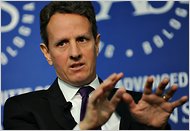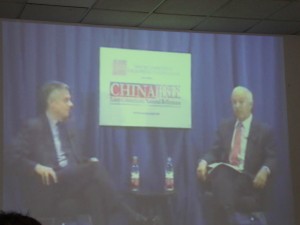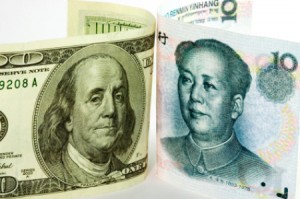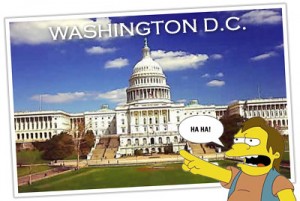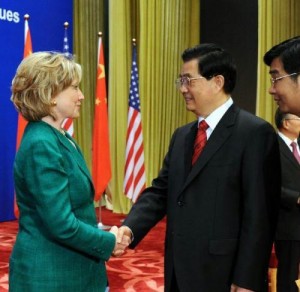Treasury Secretary Geithner Speaks on China Relationship
In preparation for President Hu Jintao’s State visit next week, Secretary of the Treasury, Timothy Geithner, provided his thoughts on the future of the U.S.-China economic relationship at John Hopkins School of Advance International Studies (SAIS) on Wednesday, January 12. While the speech provided the usual platitudes of a shared economic future, the tone was at times cautionary about the current state of the economic relationship. Geithner spoke frankly of China’s barriers to market access and concerns over currency. With Commerce Secretary Gary Locke and Secretary of State Hillary Clinton to each give their own speeches in the coming days, Hu’s State visit to the U.S. next week might not be the polite rhetoric of before. See below for Geithner’s full comments.
Secretary of the Treasury Timothy F. Geithner
“The Path Ahead for the U.S.-China Economic Relationship”
Remarks As Prepared for Delivery
It’s a pleasure to be here at SAIS.
SAIS is a leader in one of the most important challenges in public policy and education – that of helping Americans understand the world and the role we play in it. This is important because we cannot effectively pursue our national interests unless we understand the objectives, the intentions, and the capabilities of other nations.
Next week, President Obama will host President Hu Jintao at the White House.
This State Visit takes place at a time of important transition for the world economy, the Chinese economy, and the U.S. economy.
The global economy is emerging from the financial crisis, but that crisis has left lasting scars that will take years to repair. And it has left a growing gap between the growth trajectories of the large developed economies and the rapidly growing emerging economies.
While many of the major economies are still confronted with the challenge of rebuilding after crisis, many of the emerging economies are at the early stage of what should be a long period of very rapid economic growth, with rising incomes creating growing demand for resources and for investment capital.
The growth of the United States stands between these two divergent paths. We are likely to grow at about half the rate of the major emerging economies, but about twice the rate of Europe and Japan.
These dynamics will fundamentally change the balance in the world economy, forcing changes in the architecture of the trade and financial systems.
In this new global context, China’s principal economic challenge is how it will manage the next stage in its transition from a state-dominated developing economy, dependent on external demand and technology, to a more market-oriented economy, with growth powered by domestic demand and innovation.
Today, I want to talk about the implications of these changes for our economic relationship with China and for U.S. economic policy.
China presents enormous economic opportunities for the United States and for the world, but its size, the speed of its ascent, and its policies are a growing source of concern in the United States and in many other countries.
To put those concerns in context, I’d like to begin by stating a few fundamental propositions about our economic relationship.
First, the economic relationship between the United States and China provides tremendous benefits to both our nations. Even though we compete in many areas, our economic strengths are largely complementary.
Second, China faces a very complicated set of challenges as it transitions toward a more open, market oriented economy. It is very much in our interest that the Chinese manage these challenges successfully.
Third, our priorities in our economic relationship with China – from its exchange rate to its treatment of intellectual property – reflect changes that are fundamentally in China’s interest. Ultimately, China will need to make these changes in order to promote its own long-term prosperity.
Fourth, and finally, I want to emphasize that the prosperity of Americans depends overwhelmingly on the economic policies we pursue to strengthen American competitiveness. Even as we work to encourage further reforms in China, we need to understand that our strength as a nation will depend, not on choices made by China’s leaders, but on the choices we make here at home.
Now, over the last few decades, China has emerged as a major economic force.
That growth was unleashed by China’s economic reforms, a growing labor force, and one of history’s greatest economic migrations from farms to factories.
But China’s growth was also made possible by the access China enjoyed to the markets, the investments, and the technology of the United States and the other major economies.
The open, multilateral system of trade and investment, with its balance of rules and responsibilities, was built with the leadership of the United States decades before China opened up to the world.
The opportunities created by the system were fundamental to China’s economic ascent, and they remain vital to China’s ability to continue to grow.
China needs the United States, but the United States also benefits very substantially from our rapidly expanding economic relationship with China.
The benefits of this relationship are hard to capture in any one statistic, but remember this.
The United States is on track to export more than $100 billion of goods and services to China this year. Our exports to China are growing at twice the rate of our exports to the rest of the world.
These exports are supporting hundreds of thousands of jobs across the nation in all sectors – from high technology to soybeans, aircraft to autos, and forklifts to financial services.
We have a great deal invested in each other’s success.
In our economic relationship with China we have focused on two principal objectives.
The first is to expand opportunities for U.S. companies to export and sell to the Chinese market. This requires a more level playing field for U.S. companies that compete with Chinese companies in China, in the United States, and around the world.
Our second objective is to promote reforms that will reduce China’s reliance on export led growth and encourages a shift to domestic consumption and investment. As part of this, China’s exchange rate needs to strengthen in response to market forces.
I want to provide a quick review of some of our concerns and the extent of progress, as we see it, in each of these areas.
First, on the broader competitive landscape in China and the opportunities and challenges we face competing in China:
The commanding heights of China’s economy and its financial system are still dominated by the government.
Chinese companies and workers are able to take advantage of a range of preferences and subsidies and operate behind trade barriers that give them a competitive advantage relative to U.S. and other foreign firms and workers.
They get access to low-cost finance, land, and energy. They enjoy preferences in terms of access to government contracts.
Next, theft of intellectual property remains widespread in China, across many industries.
And the Chinese government has introduced a range of new policies to encourage innovation in China that are designed to favor Chinese technology over foreign technology, including in the enormous Chinese government procurement market.
Where these practices violate China’s international commitments, we are actively using the remedies available under U.S. and international trade laws to protect our interests.
And China has been gradually moving to address some of our concerns.
The government recently launched a new enforcement effort to combat the theft of intellectual property and to force Chinese companies to pay for the intellectual property they use.
The Chinese leadership has committed to expand opportunities for U.S. firms in access to procurement by government entities.
And the government has committed not to discriminate against U.S. companies that operate in China.
We welcome these commitments. They don’t address all our concerns, but they are something we can build on. And we will continue to press the Chinese to translate these commitments into further progress.
Doing so is in their interest. Government domination limits competitiveness within the Chinese economy and prevents the private sector from contributing to growth at its full potential. And you can’t promote innovation if you don’t protect intellectual property.
Alongside the reforms I’ve mentioned, we want to encourage China to move definitively away from the export driven growth model of the last few decades to a growth model driven by domestic consumption.
The Chinese leadership recognizes that China is now too large relative to the world economy for it to continue to rely on foreign demand to grow. And the government has adopted a comprehensive program of reforms to rebalance the economy and shift growth to domestic demand.
This requires reforms to increase public spending on health and education, raise and enforce minimum wages, remove barriers to investment in services, expand access to financial products for individuals and entrepreneurs, and remove subsidies for investment in the sectors that drove the initial decades of growth.
This transition will take time, but it is already having a major impact on the shape of Chinese growth, and providing increased opportunities for American companies. Domestic demand is contributing more to growth, and as a consequence, U.S. exports to China are growing more rapidly, and U.S. companies operating in China are seeing more opportunities.
Finally, and importantly, China still closely manages the level of its exchange rate and restricts the ability of capital to move in and out of the country.
These policies have the effect of keeping the Chinese currency substantially undervalued.
They also impose substantial costs on other emerging economies that run more flexible exchanges rates, and as a result have experienced a substantial loss of competitiveness against China.
This is not a tenable policy for China or for the world economy.
If China does not allow the currency to appreciate more rapidly, it will run the risk of seeing domestic inflation accelerate and face greater risk of a damaging rise in asset prices, both of which will threaten future growth. And sustaining an undervalued currency will undermine China’s own efforts to rebalance growth toward domestic consumption and higher-value-added production.
Since June of 2010, when Chinese authorities announced they would resume moving toward a more flexible exchange rate, they have allowed the currency to appreciate only about 3 percent against the dollar. This is a pace of about 6 percent a year in nominal terms, but significantly faster in real terms because inflation in China is much higher than in the United States.
We believe it is in China’s interest to allow the currency to appreciate more rapidly in response to market forces. And we believe China will do so because the alternative would be too costly – for China and for China’s relations with the rest of the world.
These are our main priorities. China’s objectives are focused on the following areas:
- China wants more access to U.S. high technology products.
- China to take greater advantage of investment opportunities in the United States.
- China would like to be accorded the same terms of access that market economies enjoy.
We are willing to make progress on these issues, but our ability to move on these issues will depend of course on how much progress we see from China.
As China reduces the role of the state in the economy, reforms policies that discriminate against U.S. companies, removes subsidies and preferences for domestic firms and technology, and allows its exchange rate to reflect market forces, then we will be able to make more progress on China’s objectives.
In any discussion of China, I think it is important for Americans to understand the solutions to our challenges in the United States rest first and foremost in the policies of Washington, not of Beijing.
Fundamentally, how many jobs and how much wealth we create will be the result of the choices we make in the United States – not the choices of others.
In our efforts to rebuild and put Americans back to work, we have to make sure we are making the investments and reform that will be essential to our capacity to grow in the future.
As countries like China, India, Brazil and other emerging economies grow and expand, we want the American economy, American workers, and American companies to play a major role in – and gain substantial benefits from – that growth.
We want to see a substantial part of that growing demand outside of the United States met by goods and services that are created and produced in the United States, and fueled by investment in the United States.
If we are successful in doing that, we will be stronger as a nation.
But to be successful in meeting that challenge, there are things we must do.
We must invest more in research and development.
We must invest more in educational reforms.
We must invest more in public infrastructure.
We must create stronger incentives for investment in the United States, by both American and foreign companies.
We must be more forceful and effective in promoting American exports.
And we must restore fiscal responsibility. This will require the government to spend less and spend more wisely, so that we can afford to make the investments that are critical to future growth. And it will require tax reform that produces a system that is more simple and more fair, that encourages growth and investment, and that will help restore fiscal sustainability.
These are our challenges. And they are not just an economic imperative, they are a national security imperative. Our strength as a nation depends on the ability of our political system to move quickly enough to put in place solutions to our long-term problems.
Our great strengths as a country have been in our openness to ideas and talent, our capacity to innovate, our excellence in higher education, a willingness to invest public resources strategically in scientific research and discovery, and the political will to confront challenges with wisdom and force.
If we preserve and build on these strengths, and if China successfully continues on its path to a more open, market economy, then both our countries and the world economy will be in a much stronger position.
The President recently said, “We should feel confident about our ability to compete, but we are going to have to step up our game.”
China’s rise offers us the opportunity of dramatic growth in demand for things Americans create and produce. But it also will force us to raise our game.
We should welcome both the opportunity and the challenge.
Thank you.
###
 On Facebook
On Facebook By Email
By Email 